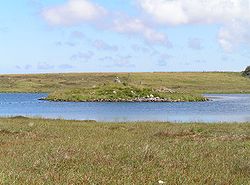- Dun
-
For other uses, see Dun (disambiguation).
Dun (from the Brythonic Din (modern Welsh Dinas) and Gaelic Dún, meaning fort) is now used both as a generic term for a fort (mainly used to describe a sub-group of hill forts) and also for a specific variety of Atlantic roundhouse. In some areas they seem to have been built on any suitable crag or hillock, particularly south of the Firth of Clyde and the Firth of Forth down across the border into Northumberland.
Dúns feature prominently along some coastal areas of the West of Ireland, particularly Co. Mayo and feature in legendary Celtic tales as the forts of the tribal kings of the tuatha. The tale of the Táin Bó Flidhais features Dúns of Flidais, Dun Chiortáin and Dún Chaocháin.
Duns, as forts, appear to have arrived with the Brythonic Celts in about the 7th century BC, associated with their Iron age culture of warrior tribes and petty chieftains. Early Duns had near vertical ramparts constructed of stone laced with timber, and where this was set on fire (accidentally or on purpose) it forms the vitrified forts where stones have been partly melted, an effect that is still clearly visible. Use of Duns continued in some cases into the medieval period.
Duns, as roundhouses, share many characteristics of brochs (often including galleries and stairs), but are smaller and probably would not have been capable of supporting a very tall structure. Very good examples of this kind of dun can be found in the Western Isles of Scotland, on artificial islands in small lochs.
Contents
Toponymy
The word in its original sense appears in many place names, and can include fortifications of all sizes and types, for example , Din Eidyn, in Gaelic Dùn Èideann which the Angles renamed Edinburgh, Dún na nGall in Ireland (Irish Gaelic: "fort of foreigners") renamed Donegal by English planters, and the Broch Dun Telve in Glenelg.
- Dundee, Dunfermline, Dunbarton
- Donegal
- Duns
- Singidun
Gaul
The Proto-Celtic form is *Dūno-,[1] yielding Gaulish δου̃νον.[2] It is ultimately cognate to English town.[3] The Gaulish term survives in many toponyms in France and Switzerland:
References
- ^ Xavier Delamarre, Dictionnaire de la langue gauloise, ISBN 2-87772-237-6
- ^ Ptolemy
- ^ Oxford Dictionary of English Etymology, ISBN 0-19-861112-9
- Scotland Before History - Stuart Piggott, Edinburgh University Press 1982, ISBN 0-85224-348-0
- Scotland's Hidden History - Ian Armit, Tempus (in association with Historic Scotland) 1998, ISBN 0-7486-6067-4
See also
Categories:- Fortification
- Geography of Scotland
- Placename element etymologies
- Archaeology of Scotland
- Toponymy
Wikimedia Foundation. 2010.

